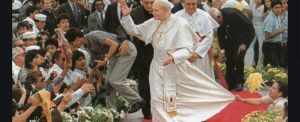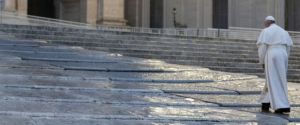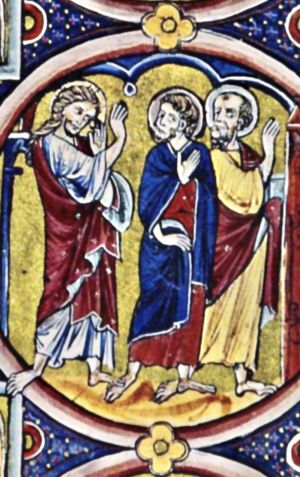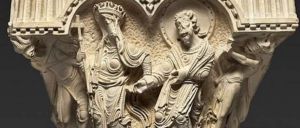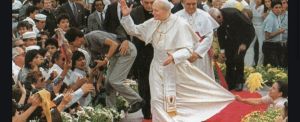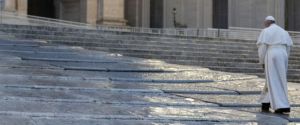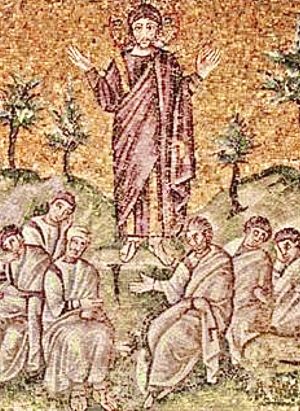
don Giuseppe Nespeca
Giuseppe Nespeca è architetto e sacerdote. Cultore della Sacra scrittura è autore della raccolta "Due Fuochi due Vie - Religione e Fede, Vangeli e Tao"; coautore del libro "Dialogo e Solstizio".
The Struggle for Liberation from the corrupt, and court life
(Mk 6:14-29)
The question "Who is Jesus?" grows throughout the Gospel of Mark, up to the answer of the centurion under the cross (Mk 15:39).
The account of people's opinions (vv.14-16) suggests that even around the first assemblies of believers some were trying to understand Christ from what was already known.
Not a few wished to understand his Person on the basis of criteria drawn from the Scriptures or from the even oral Tradition of the chosen people; from ancient beliefs and suggestions - even superstitious ones [as in the case of Herod].
But the Herald of God was not a purifier of the Temple, nor a mere patcher of dated religiosity, of domesticated cultural ideas. Not even one of the many 'reformers'... all in all conformists.
He overturns the hopes of the people, thus disturbing any school of thought; in particular, those who hold the exclusive.
When he senses danger, those shrouded in lustre and power become brazen and willing to any violence, even for a false point of honour.
Tyrants always mock the isolated, inconvenient and defenceless.
But leaders and the powerful are also cowards: they do not intend to lose face in front of the allies of their inordinate and unchecked environment, cloaked in exemptions.
During more than 40 years of his reign, Herod Antipas had created a class of officials and a system of privileged people who had the government, the treasury, the economy, justice, every aspect of civic and police life in their hands.
His command covered the territory extensively.
In every village, the ruler could count on the support of all the cliques and various local leaders, interested in controlling consciences - together with compromised scribes and Pharisees, linked to his politics.
Besides being a puppet of Rome - to which he guaranteed control of the territory and the flow of taxes - Herod was depraved and (indeed) superstitious. He thought that even a light oath to a dancer should be kept.
Josephus Flavius, on the other hand, reports that John was in prison for fear of the ruler of a popular uprising - and was considering that it was good for him to act in advance.
The assassination plot was probably casual.
The brave man who denounces abuse is crushed, but the Voice of his martyrdom is no longer silent.
This is why the episode does not induce Jesus to greater caution. Once an envoy is killed, another greater and more incisive one takes his place: the last of the Prophets, the Son of God.
The delinquents must not delude themselves that Providence does not know how to equip even the most spineless high places with the counterbalance of coherent and valid people.
Generic and confusing religiosity can adapt to any season and be embraced even by those who think others' lives are worthless - but a Prophet does not stop at the whim of the corrupt system.
Both John and the Lord never visited the new Herodian capital, Tiberias, the city of courtly palaces. Built - after Sefforis, where Jesus also worked - in diplomatic homage to the Roman emperor.
In the Palestinian villages, the life of the people was harassed with taxes and abuses by landowners, who did not even reside there; controlled by the perfect combination of interests between civil and religious power.
Complicity that the leaders slyly tried to impose, according to their way of life. Also by conveying many calibrated narratives to the crowds, and inculcating (useless) knowledge.
The leaders of the popular, orthodox and compliant faith - as is often the case - were on the leash of the authorities on the ground, who considered themselves definitive and found strength in the coalition.
It seemed absurd that anyone in that society would dare to break the wall of silence that ensured that troublemakers, 'spiritual' authorities and even low-level bullies could consider themselves untouchable.
Faced with the (unceremonious) blackmail of the privileged who were in control of every social and cultural stratum, it seemed impossible to start a new path, or to say and do anything unaligned.
John and Jesus challenge the status quo and attract the vengeance of those who seek to perpetuate the prerogatives of the ancient hierarchical cosmos, and the anger of those who are exposed in their hypocrisies.
This is the real difficulty that the proclamation of the new kingdom encounters in the world. Its contemptuous rejection and every attempt at murder will be a litmus test of our noble critical frankness, the revelation of which will run parallel to the Two.
The Baptiser was an intrepid denouncer of vice, superficiality, malpractice and the perversions of the powerful.Of these, Pope Francis would have spoken of good manners [in the pursuit of cordial alliances] and bad habits [in the irresponsible and insulting private life, and in the violence with which dominion over the little ones is perpetuated].
Jesus, too, put his foot down, instead of making an internal career. In spite of John's foreboding, he rejected the path of weighed-up malice, pretense, diplomacy, and pirouettes of circumstance.
The Master stood in defence of conscience and divine law itself, against opportunistic religious and political authorities, whom he challenged head-on.
Today too, the Lord asks for courage not to bow down in the face of corruption, evil, the current mentality; to be different in the way of thinking, of speaking [mellifluous].
He asks to choose and act.
Unheard, mocked, opposed by many lords, luminaries and courtiers, the children of God bear witness to the Truth, paying for it in person: perfect Lethitude.
Authentic Fullness.
To internalise and live the message:
Do you know victims of authoritarianism, corruption, domination of the powerful, excess and extravagance of power? Even in the Church?
How is it that this still happens - and everything is silenced sooner or later?
Who is Jesus according to you and others? And what would you say?
He denounced, even when protagonists were the powerful
As an authentic prophet, John bore witness to the truth without compromise. He denounced transgressions of God's commandments, even when it was the powerful who were responsible for them. Thus, when he accused Herod and Herodias of adultery, he paid with his life, sealing with martyrdom his service to Christ who is Truth in person.
Let us invoke his intercession, together with that of Mary Most Holy, so that also in our day the Church will remain ever faithful to Christ and courageously witness to his truth and his love for all.
[Pope Benedict, Angelus 24 June 2007]
Heroic commitment not to give in to the difficulties that drive one to compromise
1. [...] Christian tradition commemorates the martyrdom of St John the Baptist; the Messiah himself says in praise of him: "none born of woman is greater" (cf. Lk 7: 28). He gave to God the supreme witness of his blood, sacrificing his life for truth and justice; indeed, his head was cut off at the orders of Herod, whom he had dared to tell that it was not lawful to take his brother's wife (cf. Mc 6: 17-29).
2. In the Encyclical Veritatis Splendor, recalling the sacrifice of John the Baptist (cf. n. 91), I observed that martyrdom is "an outstanding sign of the holiness of the Church" (n. 93). Indeed, it "represents the high point of the witness to moral truth" (ibid.).
Although relatively few are called to make this supreme sacrifice, it is nonetheless "a consistent witness which all Christians must daily be ready to make, even at the cost of suffering and grave sacrifice" (ibid.). At times, a truly heroic effort is also needed in daily life, in order not to give in to the difficulties that are an incentive to compromise and to live the Gospel "sine glossa".
3. The heroic example of John the Baptist reminds us of the martyrs for the faith who down the centuries followed courageously in his footsteps. I recall in particular the multitude of Christians in the last century who were also victims of religious hatred in various European nations. Today too, in some parts of the world, believers are still subjected to harsh trials for adhering to Christ and his Church.
May these brothers and sisters of ours feel the full solidarity of the entire Ecclesial Community! Let us entrust them to the Blessed Virgin, Queen of Martyrs, whom we call on together at this moment.
[Pope John Paul II, Angelus 29 August 2004]
Parallel roads
A man, John, and a road, which is that of Jesus, indicated by the Baptist, but is also ours, in which we are all called at the moment of trial.
It starts from the figure of John, "the great John: in the words of Jesus "the greatest man born of a woman"" the reflection of Pope Francis in the Mass celebrated at Santa Marta on Friday 6 February. The Gospel of Mark (6:14-29) recounts the imprisonment and martyrdom of this "man faithful to his mission; the man who suffered many temptations" and who "never, never betrayed his vocation". A man 'faithful' and 'of great authority, respected by all: the great of that time'.
Pope Francis paused to analyse his figure: 'What came out of his mouth was right. His heart was just'. He was so great that "Jesus will also say of him that 'it is Elijah who has returned, to clean the house, to prepare the way'". And John "was conscious that his duty was only to proclaim: to announce the proximity of the Messiah. He was conscious, as St Augustine makes us reflect, that he was the voice only, the Word was another'. Even when 'he was tempted to "rob" this truth, he remained righteous: "I am not, behind me comes, but I am not: I am the servant; I am the servant; I am the one who opens the doors, so that he may come".
At this point the Pontiff introduced the concept of the way, because, he recalled, 'John is the forerunner: forerunner not only of the Lord's entry into public life, but of the Lord's entire life'. The Baptist 'goes forward in the Lord's way; he bears witness to the Lord not only by showing him - "This is it!" - but also by bringing life to the end as the Lord has brought it'. And by ending his life "with martyrdom" he was "a forerunner of the life and death of Jesus Christ".
The Pope went on to reflect on these parallel paths along which "the great" suffers "many trials and becomes small, small, small to the point of contempt". John, like Jesus, "annihilates himself, he knows the road of annihilation. John with all that authority, thinking about his life, comparing it with that of Jesus, tells people who he is, what his life will be like: 'It is better for him to grow, I instead must diminish'". This, the Pope stressed, is "the life of John: to diminish before Christ, so that Christ may grow". It is "the life of the servant who makes room, makes way for the Lord to come".
John's life "was not easy": in fact, "when Jesus began his public life", he was "close to the Essenes, that is, to the observants of the law, but also of prayers, of penances". Thus, at a certain point, during the time he was in prison, 'he suffered the ordeal of darkness, of the night in his soul'. And that scene, Francis commented, "moved: the great, the greatest sent two disciples to Jesus to ask him: 'But John asks you: is it you or have I made a mistake and must we wait for someone else?'" Along John's path therefore came 'the darkness of error, the darkness of a life burnt in error. And this was a cross for him".
To John's question "Jesus answers with the words of Isaiah": the Baptist "understands, but his heart remains in darkness". Nevertheless he lends himself to the demands of the king, 'who liked to hear him, who liked to lead an adulterous life', and 'almost became a court preacher, of this perplexed king'. But "he humbled himself" because "he thought he was converting this man".
Finally, the Pope said, 'after this purification, after this continual descent into annihilation, making way for the annihilation of Jesus, his life ends'. That king from being perplexed 'becomes capable of a decision, but not because his heart has been converted'; rather 'because the wine gives him courage'.
And so John ends his life 'under the authority of a mediocre, drunken and corrupt king, at the whim of a dancer and the vengeful hatred of an adulteress'. Thus 'ends the great, the greatest man born of woman', commented Francis, who confessed: 'When I read this passage, I am moved'. And he added a useful consideration for the spiritual life of every Christian: "I think of two things: first, I think of our martyrs, the martyrs of our day, those men, women, children who are persecuted, hated, driven from their homes, tortured, massacred". And this, he stressed, 'is not a thing of the past: this happens today. Our martyrs, who end their lives under the corrupt authority of people who hate Jesus Christ'. Therefore, "it is good for us to think about our martyrs. Today we think of Paul Miki, but that was in the 1600s. Let us think of those of today, of 2015".
The Pontiff went on to add that this passage also prompts him to reflect on himself: 'I too will end. All of us will end. No one's life is 'bought'. We too, willingly or unwillingly, go down the road of the existential annihilation of life'. And this, he said, prompts him "to pray that this annihilation resembles Jesus Christ, his annihilation, as much as possible".
This closes the circle of Francis' meditation: 'John, the great, who continually diminishes to nothingness; the martyrs, who diminish today, in our Church of today, to nothingness; and we, who are on this road and going towards the earth, where we will all end'. In this sense the Pope's final prayer: "May the Lord enlighten us, make us understand this road of John, the forerunner of the road of Jesus; and the road of Jesus, who teaches us how ours should be."
[Pope Francis, St. Martha, in L'Osservatore Romano 07.02.2015]
Sending disciples: trust, humanization, sobriety
Sober, but in sandals
(Mk 6:7-13)
The passage of Nazareth - painful for Jesus himself - and the description of the disciples sending, was intended to be a support and light for believers.
The Son of God is rejected by his own people, and what was his country before is no longer.
We must not therefore be discouraged: conflicts force us to be face to face with new ways of being (and opportunities for Communion).
In the relationship with the Father and the circumstances, no one get by on his own, perhaps centering existence on goals and only on himself - or changing residence (v. 10) and then looking for excessive instruments to establish himself [under the pretext of ‘effectiveness’].
The witness of Christ is profound and relational to the point of coexistence; non-individualistic: to be faced by showing reciprocity, capacity for non-alienating exchange; at least between two (v.7).
Furthermore, the goal cannot be pursued if life is disintegrated by the opinions around it, and devoid of any principle of relationships transformation - an expression of the Covenant that arouses spirit of fraternity.
As well as a propulsive “model”, a “principle” of analysis and prognosis for problem-solving, and for a future of coexistence; through a completion of self-recognised 'opposing sides' [through micro-relationships].
In all religions, the ideal of perfection is the achievement of one's own purification, advancement, balance.
But this is not enough for we to proclaim that the Kingdom has come! It’s the result of an artisanal process, carried out in stages and attempts; of Love, in the Exodus.
In this way, the Risen One has invested us with a quiet but irresistible and evident strength: his effective Word.
Logos that in us becomes lucidity, charge, impulse, ability to listen [which puts us back on our feet; together, in a position to manage things]: a compassionate power never seen before.
The proposal of the Gospels presupposes a spirit of sobriety, risk, royal fraternity: in this way environments are evangelized, transmitting passion for life and annihilating the forces of death that distance us from our neighbor.
Trusting in hospitality and sharing, the new missionaries finally disregard legalistic purity standards (v.8) and show a different access to purity itself, to relationships, to intimacy with the Father.
Therefore, essential ingredients for building the community elsewhere are: being satisfied and renouncing ambition, sharing also in culture [giving space to all intuitions]; familiarity in normal jobs and wages; welcoming the excluded.
As in the Semitic community, the new ‘envoys’ must become close brothers, defenders and redeemers (Go’el) of the marginalized. In this sense, we too personify the figure of Christ in history and contexts.
Protecting the poor and needy (v.13) unfolds the teaching and work of Jesus, who had done so much to stem the disintegration of community life - then affected by political, economic and religious servility.
Therefore, avoiding the ambiguity of riches, the children of God would not have nourished the instinct to dominate others.
Unfortunately, whoever is a friend of triumphalism and possesses in excess, will easily miss the main thing, characteristic of credibility: trust in Providence - the only spirit that doesn’t invalidate the situation.
Jesus warns us, so that we do not deny him with our grabbing behavior, lover of luxury, ready both to deferences and to indulge in power games; performing at all costs, always anxious for the role and economic levels.
Of course, the Son of God dreams a poor Church [not only ‘of the poor’] - but he grants an element of opulence for us, indeed he wants it: that we wear sandals (v. 9); at that time in Rome a sign of freedom and dignity not beggar).
Yes, because we have to rediscover the human - and walk a lot.
[Thursday 4th wk. in O.T. February 5, 2026]
Sending out of disciples: trust, humanisation, sobriety
Sober, but with sandals
(Mk 6:7-13)
And I and You
Truth is not at all what I have. It is not at all what you have. It is what unites us in suffering, in joy. It is what unites us in our union, in the pain and pleasure we give birth to. Neither I nor You. And me and You. Our common work, permanent amazement. Its name is Wisdom.
(Irénée Guilane Dioh)
Mk wrote his Gospel for the Roman communities, at a time when they seemed to have no future. Yet, they lived through this trying situation without shouting.
Nero began persecuting the small fraternities in 64. The following year, the Jewish revolt broke out. In the short period of the four Caesars, civil war reached its peak in Rome. In 70 Jerusalem was razed to the ground.
The passage from Nazareth - painful for Jesus himself - and the description of the sending of the disciples, was intended to be a support and light for the believers.
The Son of God [and in him anyone who authentically witnesses to him] is rejected by his own people, and what used to be his country is now no more.
This is not to be discouraged: conflicts force one to come face to face with new ways of being.
Despite the difficulties that in themselves would only create emotional traps, any situation is not without an orientation and precious horizons of new lightness, of the possibility of surrender that brings one back to life; above all, of true Communion.
In the relationship with the Father and circumstances, no one gets by on his own, perhaps by centring existence on goals and only on himself - or by changing residence (v.10) and then seeking excessive means to establish himself [under the pretext of effectiveness].
The witness of Christ is profound, and relational to the point of coexistence (even more than day-by-day); not individualistic: to be approached by showing reciprocity, a capacity for non-alienating exchange - at least between two (v.7).
It is in the face of a travelling companion that opposites are recognised [the same poles that inhabit each soul, in secret...].
The goal, then, cannot be pursued if the head remains disintegrated by the opinions around it, and the desire devoid of any principle of transforming relations - an expression of the Covenant that still arouses collaboration, a spirit of fraternity, a path.
Therefore 'model', 'principle' of analysis and prognosis for the solution of problems, and for a future of coexistence; through a completion of 'opposite sides' recognised in themselves [through micro-relationships].
In all religions, the ideal of perfection is the attainment of one's own purification, advancement, balance.
But this is not enough for us to proclaim that the Kingdom has come! It is the fruit of craftsmanship, of a journey carried out as in stages and attempts; of Love, in the Exodus.
In this way, the Risen One has invested us with a quiet but irresistible and evident force: his efficacious Word.
Word that in us becomes lucidity, charge, impetus, the ability to listen [which puts us back on our feet; at the same time, it enables us to handle things]: a compassionate power never seen before.
The proposal of the Gospels presupposes a spirit of sobriety, risk, royal empathy: this is how we evangelise environments, transmitting passion for life and annihilating the forces of death that alienate our neighbour.
By trusting in hospitality and sharing, the new missionaries finally disregard the norms of religious purity (v.8) and show a different access to the same purity, to relationships, to intimacy with the Father.
Thus, essential ingredients for building community elsewhere [and everywhere] are: contentment and renouncing ambition, sharing even in culture [giving space to all insights], familiarity in normal work and compensation; welcoming the excluded.
As in the Semitic community mentality, the new 'envoys' must make themselves the next brothers, defenders and redeemers (Go'el) of the marginalised. In this sense, we too personify the Christ figure in history and contexts.
By protecting the wretched and needy (v.13), we unfold the teaching and work of Jesus, who had done so much to stem the disintegration of community life - at that time marred by political, economic and religious servility.
The witnesses have eyes unclouded by habitual thinking: they see the divine in the soul of the seemingly summary human.
Thus - avoiding the ambiguity of riches - God's children would not have nurtured the instinct of domination over others.
Not everyone feels the call to voluntary renunciation, but each must ask himself whether material goods generate the false security and [in fact] slavery that then blocks the inclination to service.
Unfortunately, those who are friends of triumphalism and possess in excess, easily lack the main thing, which is characteristic of credibility: trust in Providence - the only spirit that does not vitiate the situation.
All the Founders had the same concern as the Lord: not to contradict what was being proclaimed, and to have a free heart.
The Kingdom of God is made present in sobriety more than in abundance, and in the spirit of friendship more than in distinction: this is the new teaching of the Faith, compared to widespread beliefs.
In a situation almost three centuries later, which was rapidly beginning to deteriorate, Hilary of Poitiers thus denounced the seductions of power towards church leaders - already established - to whom the ancient order willingly began to grant lavish privileges (in order to instrumentalise them):
"We do not have an anti-Christian emperor [Constantius II, son of Constantine I]; we used to be persecuted, but now we have to fight against an even more insidious persecutor, against an enemy who does not beat us but flatters us, does not scourge our backs but caresses our bellies; does not confiscate our goods, for then he would give us life, but enriches us, to give us death, to make us become evangelical counter-witnesses. He does not push us towards freedom by putting us in prison, but enslaves us, inviting us to the palace and filling us with honours. He does not strike our bodies, but takes possession of our hearts; he does not cut off our heads with the sword, but kills our souls with money'.
So much for the spirit of dispossession, preached outwardly or to subordinates only!
Commenting on the Tao Tê Ching (xx), Master Wang Pi acknowledges:
"The Tao, the nurturing mother, is the foundation of life. But all men put on one side the foundation that makes people live, and cherish the flourishes of the accessory and the tinsel'.
Jesus warns, lest we disprove him with our grasping, luxury-loving behaviour, ready both for deference and pandering to power games; performing at all costs, always scrambling for role and economic levels.
"I dream of a free and credible Church, a Church that is poor and for the poor!" - stressed Pope Francis immediately after his election as pontiff.
Of course, the Son of God dreams of a poor Church [not just 'of the poor'] - but an element of opulence for us he concedes, indeed he wants it: that we wear sandals (v.9); at that time in Rome a sign of freedom and dignity not begging).
Yes, because we must rediscover the human - and walk a lot.
To internalise and live the message:
How do you participate in the Mission of Jesus and the disciples? How can you avoid cultural, doctrinal or charismatic closures (already all designed-regulated), and live the universality of the new humanisation?
Cleanse the eyes of the soul. Success they leave to God
In this […] Gospel, Jesus takes the initiative of sending the Twelve Apostles out on mission (cf. Mk 6:7-13). In fact the term “apostles” means, precisely, “messengers” or “envoys”. Their vocation was to be fully achieved only after Christ’s Resurrection with the gift of the Holy Spirit at Pentecost. Yet it is very significant that Jesus wants to involve the Twelve in his action from the outset: it is a sort of “apprenticeship” with a view to the great responsibility that awaited them. The fact that Jesus calls certain disciples to collaborate directly in his mission demonstrates one aspect of his love, namely, he does not spurn the help that other people can contribute to his work; he knows their limitations, their weaknesses, but bears no contempt for them. On the contrary Jesus confers on them the dignity of being his envoys. He sends them out two by two and gives them instructions which the Evangelist sums up in a few sentences. The first concerns the spirit of detachment: the Apostles must not be attached to money or to other comforts. Then Jesus warns the disciples that they will not always receive a favourable welcome. Sometimes they will be rejected; they might even be persecuted. However this must not frighten them: they must speak in Jesus’ name and preach the Kingdom of God without being worried about whether or not they will succeed. Succeed — its success must be left to God [...].
Jesus warns the Twelve that in some places they may be rejected. Should this be the case, they are to go elsewhere, having shaken the dust from their feet in public. This sign expresses detachment in two senses: moral detachment — as if to say it is you who have refused the proclamation offered to you — and material detachment. We did not seek and do not want anything for ourselves (cf. Mk 6:11).
The other very important instruction in the Gospel passage is that the Twelve must not be content with preaching conversion. They must accompany their preaching, in accordance with Jesus’ instructions and example, with care for the sick, with caring for those who are sick in body and in spirit. It speaks of the healing of illnesses and also of driving out demons, that is, of purifying the human mind, cleansing, cleansing the eyes of the soul that are clouded by ideologies and hence cannot see God, cannot see truth and justice. This twofold corporal and spiritual healing is always the mandate of Christ’s disciples. Hence the apostolic mission must always include the two aspects of preaching God’s word and of showing his goodness in gestures of charity, service and dedication.
[Pope Benedict, Frascati homily 15 July 2012]
Integral Vocation, Announcement, and respect. Proposal to freedom
7. The urgency of missionary activity derives from the radical newness of life brought by Christ and lived by his followers. This new life is a gift from God, and people are asked to accept and develop it, if they wish to realize the fullness of their vocation in conformity to Christ. The whole New Testament is a hymn to the new life of those who believe in Christ and live in his Church. Salvation in Christ, as witnessed to and proclaimed by the Church, is God's self-communication: "It is love which not only creates the good, but also grants participation in the very life of God: Father, Son and Holy Spirit. For he who loves desires to give himself."
God offers mankind this newness of life. "Can one reject Christ and everything that he has brought about in the history of mankind? Of course one can. Man is free. He can say 'no' to God. He can say 'no' to Christ. But the fundamental question remains: Is it legitimate to do this? And what would make it legitimate?"
8. In the modern world there is a tendency to reduce man to his horizontal dimension alone. But without an openness to the Absolute, what does man become? The answer to this question is found in the experience of every individual, but it is also written in the history of humanity with the blood shed in the name of ideologies or by political regimes which have sought to build a "new humanity" without God.
Moreover, the Second Vatican Council replies to those concerned with safeguarding freedom of conscience: "The human person has a right to religious freedom.... All should have such immunity from coercion by individuals, or by groups, or by any human power, that no one should be forced to act against his conscience in religious matters, nor prevented from acting according to his conscience, whether in private or in public, whether alone or in association with others, within due limits."
Proclaiming Christ and bearing witness to him, when done in a way that respects consciences, does not violate freedom. Faith demands a free adherence on the part of man, but at the same time faith must also be offered to him, because the "multitudes have the right to know the riches of the mystery of Christ-riches in which we believe that the whole of humanity can find, in unsuspected fullness, everything that it is gropingly searching for concerning God, man and his destiny, life and death, and truth.... This is why the Church keeps her missionary spirit alive, and even wishes to intensify it in the moment of history in which we are living." But it must also be stated, again with the Council, that "in accordance with their dignity as persons, equipped with reason and free will and endowed with personal responsibility, all are impelled by their own nature and are bound by a moral obligation to seek truth, above all religious truth. They are further bound to hold to the truth once it is known, and to regulate their whole lives by its demands.".
[Pope John Paul II, Redemptoris Missio]
Anointing of closeness
I am glad to be able to keep the Sunday Angelus appointment, even here from “Gemelli” Polyclinic. I thank you all: I have felt your closeness and the support of your prayers. Thank you from the bottom of my heart!
The Gospel passage we read today in the Liturgy recounts that Jesus’ disciples, sent by him, “anointed with oil many that were sick and healed them” (Mk 6:13). This “oil” also makes us think of the Sacrament of the Anointing of the Sick, which gives comfort to spirit and body. But this “oil” is also listening, the closeness, the care, the tenderness of those who take care of the sick person: it is like a caress that makes you feel better, soothes your pain and cheers you up. All of us, all, need this “anointing” of closeness and tenderness sooner or later, and we can all give it to someone else, with a visit, a phone call, a hand outstretched to someone who needs help. Let us remember that, in the protocol of the final judgment — Matthew 25 — one of the things they will ask us will be about closeness to the sick.
[Pope Francis, Angelus 11 July 2021]
Apprenticeship: radiating from a Face, from a Centre
Today’s Gospel passage (cf. Mk 6:7-13) narrates the moment Jesus sends the Twelve [Apostles] on mission. After calling each of them by name “to be with him” (Mk 3:14), listening to his words and observing his gestures of healing, he now calls them again to “send them out two by two” (6:7) to the villages he was going to visit. It is a sort of “internship” of what they would be called to do following the Resurrection of the Lord, through the power of the Holy Spirit.
The Gospel passage pauses on the style of the missionary which we can sum up in two points: the mission has a centre; the mission has a face.
First of all, the missionary disciple has his centre of reference who is Jesus himself. The narrative indicates this by using a series of verbs which have him as the subject — “He called to him”; he “began to send them”; he “gave them authority”; “he charged them”, “he said to them” (vv. 7, 8, 10) —, so that the going out and working of the Twelve appears to be radiating from a centre, reaffirming the presence and work of Jesus in their missionary actions. This demonstrates that the Apostles have nothing of their own to proclaim, nor any abilities to manifest, but rather that they speak and act as “emissaries”, as messengers of Jesus.
This episode of the Gospel also applies to us and not only to priests but to all baptized people called to witness to the Gospel of Christ in the various spheres of life. And for us too, this mission is authentic only in so far as its unchanging centre who is Jesus. It is not an initiative of faithful individuals nor of groups and not even of large gatherings. It is the mission of the Church, inseparably united to her Lord. No Christian proclaims the Gospel “on his/her own”, but is only sent by the Church who received the mandate from Jesus himself. Indeed it is Baptism that makes us missionaries. A baptized person who does not feel the need to proclaim the Gospel, to proclaim Jesus, is not a good Christian.
The second characteristic of the missionary’s style is, so to speak, a face, which consists in the poverty of means. His accoutrement responds to a criteria of modesty. Indeed the Twelve have the order to “take nothing for their journey except a staff; no bread, no bag, no money in their belts” (6:8). The Teacher wants them to be free and unhampered, without reserves and without favours, certain only of the love of the One who sends them, strengthened only by his Word which they go to proclaim. The staff and the sandals are the gear of pilgrims because that is what the messengers of the Kingdom of God are, not omnipotent managers, not irreplaceable officials, not celebrities on tour. Let us think for example of this Diocese of which I am Bishop. Let us think about some saints from this Diocese of Rome: Saint Philip Neri, Saint Benedict Joseph Labre, Saint Alessio, Blessed Ludovica Albertoni, Saint Frances of Rome, Saint Gaspare del Bufalo and many others. They were not officials or business people, but rather humble workers of the Kingdom. This was the face they had. And to this “face” also belongs the way the message is received: it can happen that one is not welcomed or listened to (cf. v. 11). This too is poverty: the experience of failure. The experience of Jesus who was rejected and crucified anticipates the destiny of his messenger. And only if we are united to Him, who died and Rose, can we find the courage to evangelize.
May the Virgin Mary, the first disciple and missionary of the Word of God, help us to convey to the world the message of the Gospel in a humble and radiant exultation, beyond any rejection, misunderstanding or tribulation.
[Pope Francis, Angelus 15 July 2018]
4th Sunday in O.T.
Fourth Sunday in Ordinary Time (year A) [1 February 2026]
May God bless us and may the Virgin protect us. Rereading and meditating on the Beatitudes in Matthew's Gospel is always an invitation to rediscover the heart of the Gospel faith and to have the courage to live it faithfully.
*First Reading from the Book of the Prophet Zephaniah (2:3; 3:12-13)
The Book of Zephaniah is striking for its sharp contrasts: on the one hand, there are terrible threats against Jerusalem, with the prophet appearing very angry; on the other hand, there are encouragements and promises of a happy future, always directed at the city. The question is: to whom are the threats addressed and to whom the encouragement? Historically, we are in the 7th century BC, in the kingdom of Judah, the southern kingdom. The young king Josiah ascends the throne at the age of eight, after the assassination of his father, in very turbulent times. The Assyrian empire, with its capital at Nineveh, is expanding, and local kings often prefer to surrender to avoid destruction: Jerusalem becomes a vassal of Nineveh. The prophets, however, firmly support the freedom of the chosen people: asking for an alliance with an earthly king means not trusting in the King of heaven. Accepting Assyrian protection was not only a political act, but also entailed the cultural and religious influence of the ruler, with the risk of idolatry and the loss of Israel's mission. Zephaniah denounced all this and prophesied punishment: 'I will raise my hand against Judah and against all the inhabitants of Jerusalem... on the day of the Lord's wrath' (Zephaniah 1:4-6), a text reminiscent of the famous Dies Irae. Seek the Lord, all you humble of the land. Alongside the threats, Zephaniah addresses a message of comfort to the "humble of the land" (in Hebrew anawim, the bowed down), who are law-abiding and righteous, and therefore protected from the Day of the Lord's wrath: God himself is with them. It is the day when creation will be renewed and evil destroyed. The message is not for others, but for each one of us: we are all called to conversion, to become "the humble of the land," the "Remnant of Israel" that the previous prophets had announced. God, who is faithful, will always save at least a small group that has remained faithful. It will be this small remnant, poor and humble, that will carry on the mission of the chosen people: to reveal God's plan to the world. Being humble means recognising one's own limitations (humus) and trusting totally in God. Thus, God's judgement is not against people, but against the evil that corrupts. The small faithful remnant will be the leaven in the world, preserving the true identity of the people and the divine mission. God's wrath strikes only evil, never the innocent. Zephaniah also criticises the adoption of Assyrian customs, such as foreign clothing (Zeph 1:8): it was not just fashion, but a sign of imitation of the pagans, a risk of losing identity and faith.
*Responsorial Psalm (145/146)
Here we have three verses from the Psalm as an inventory of the beneficiaries of God's mercy: the oppressed, the hungry, the chained, the blind, the afflicted, the strangers, the widows and the orphans—all those whom men ignore or despise. The Israelites know these situations because they have experienced them: oppression in Egypt, then in Babylon. The Psalm was written after the return from the Babylonian exile, perhaps for the dedication of the rebuilt Temple. Liberation from evil and oppression is perceived as proof of God's faithfulness to the covenant: "The Lord brings justice to the oppressed, the Lord frees those in chains." God also provides for material needs: during the Exodus, he fed the people with manna and quails. Gradually, God reveals himself to the blind, lifts up the afflicted and guides the people towards justice: 'God loves the righteous'. The Psalm is therefore a song of gratitude: "The Lord brings justice to the oppressed / gives bread to the hungry / frees those in chains / opens the eyes of the blind / lifts up those who are afflicted / loves the righteous / protects the stranger / supports widows and orphans. The Lord is your God forever." The insistence on the name Lord (7 times) recalls the sacred Tetragrammaton YHVH, revealed to Moses at the burning bush, symbol of God's constant and liberating presence. "The Lord is your God forever," the final phrase recalls the Covenant: "You shall be my people, and I will be your God." The Psalm looks to the future, strengthening the hope of the people. The name of God Ehiè asher ehiè (I am who I am / I will be who I will be) emphasises his eternal presence. Repeating this Psalm serves to recognise God's work and to guide conduct: if God has acted in this way towards Israel, the people must behave in the same way towards others, especially the excluded. The Law of Israel provided rules to protect widows, orphans, and foreigners, so that the people would be free and respectful of the freedom of others. The prophets judged fidelity to the Covenant mainly on the basis of attitude towards the poor and oppressed: the fight against idolatry, the promotion of justice and mercy, as in Hos 6:6 (I desire mercy, not sacrifice) and Mic 6:8 (Act justly, love mercy, walk humbly with God). Sirach also reminds us: 'The tears of the widow flow down the face of God' (Si 35:18), emphasising that those who are close to God must feel compassion for those who suffer.
*Second Reading from the First Letter of Saint Paul the Apostle to the Corinthians (1:26-31).
It would seem to be the parable of the Pharisee and the tax collector: the world is 'turned upside down'. Those who appear wise in the eyes of men, as Paul points out, are not considered worthy before God. This does not mean that Paul despises wisdom: since the time of King Solomon, it has been a virtue sought after in prayer, and Isaiah presents it as a gift of the Spirit of God: 'The Spirit of the Lord shall rest upon him, the spirit of wisdom and discernment...' The Bible distinguishes between two types of wisdom: the wisdom of men and the wisdom of God. What seems reasonable in the eyes of men may be far from God's plan, and what is wise in the eyes of God may appear foolish to men. Our logic is human, God's is the logic of love: the folly of divine love, as Paul says, surpasses all human reasoning. This is why the life and death of Christ may seem scandalous. Isaiah says it clearly: "My thoughts are not your thoughts, and your ways are not my ways" (Is 55:8). This distance between human and divine thought is such that Jesus goes so far as to rebuke Peter: "Get behind me, Satan! You are not thinking according to God, but according to men" (Mt 16:23). God is the "All-Other": the hierarchy of human values is overturned before him. Often in the history of the Covenant, God chooses the least: think of David, the youngest of Jesse's sons, or the people of Israel, "the least of all" (Deut 7:7; Deut 9:6). God's choices are gratuitous, independent of human merit. True wisdom, divine wisdom, is a gift from We cannot understand God with our own strength: everything we know about Him is revealed to us by Him. Paul reminds the Corinthians that all knowledge of God is a gift: "In him you have received every spiritual blessing... you are not lacking in any spiritual gift" (1 Cor 1:4-7). The gift of knowledge of God is not a reason for pride, but for gratitude. As Jeremiah says: "Let not the wise man boast of his wisdom... but of having the intelligence to know me, the Lord" (Jer 9:22-23). Paul applies these principles to the Corinthians: in the eyes of the world, they were neither wise, nor powerful, nor noble. Yet God calls them, creating his Church out of their poverty and weakness. Their 'nobility' is Baptism. Corinth becomes an example of God's surprising initiative, recreating the world according to his logic, inviting men not to boast before God, but to give him glory for his love.
*From the Gospel according to Matthew (5:1-12a)
I pause to reflect on the beatitude that may seem most difficult: 'Blessed are those who mourn, for they will be comforted' (Mt 5:4). It is not a question of rejoicing in mourning itself, nor of considering suffering as good fortune. Jesus himself devoted much of his life to comforting, healing and encouraging people: Matthew reminds us that 'Jesus proclaimed the Good News of the Kingdom and healed every disease and infirmity among the people' (Mt 4:23). The tears Jesus speaks of are, rather, tears of repentance and tears of compassion. Think of St Peter, who wept bitterly after his denial, finding consolation in God's mercy. Or remember the vision of the prophet Ezekiel: on the last day, God "will mark with a cross on the forehead those who groan and lament over the abominations that are committed" (Ezekiel 9:4). These words of Jesus were addressed to his Jewish contemporaries, who were accustomed to the preaching of the prophets. For us, understanding them means rereading the Old Testament. As the prophet Zephaniah invites us: 'Seek the Lord, all you humble of the earth' (Zeph 2:3). And the psalm sings: “I have asked one thing of the Lord: to dwell in the house of the Lord all the days of my life” (Ps 145/146:5). These are the true “poor in spirit,” those who entrust themselves completely to God, like the tax collector in the parable: aware of their sins, they open themselves to the Lord’s salvation. Jesus assures us that those who seek God with all their heart will be heard: "Seek and you will find; knock and it will be opened to you" (Mt 7:7). And the prophets call those whose hearts are turned solely to God "pure". The Beatitudes, therefore, are Good News: it is not power, knowledge or wealth that leads us to the Kingdom, but gentleness, mercy and justice. As Jesus says to his disciples: " I am sending you out like lambs among wolves” (Lk 10:3). Each beatitude points to a path towards the Kingdom: each “Blessed” is an invitation, an encouragement: it is as if it were saying, “take courage, you are on the right path”. Our weaknesses become fertile ground for God’s presence: poverty of heart, tears, hunger for justice, persecution. Paul reminds us: “Let the one who boasts, boast in the Lord” (1 Cor 1:31). Finally, let us remember that Jesus is the perfect model: poor in heart, gentle, merciful, compassionate, just and persecuted, always grateful to the Father. His life teaches us to look at ourselves and others through the eyes of God, and to discover the Kingdom where we least expect it.
St Augustine writes in his commentary on this beatitude: "Blessed, says the Lord, are those who mourn, for they shall be comforted. He does not refer to bodily sadness, but to the sorrow of the heart for sins and the desire to convert to God" (Enarrationes in Psalmos, 30:5).
+Giovanni D'Ercole
This is the road Jesus points out to all who want to be his disciples: "Judge not... condemn not... forgive, and you will be forgiven; give, and it will be given to you.... Be merciful, even as your Father is merciful" (Lk 6: 36-38). In these words we find very practical instructions for our daily conduct as believers [Pope Benedict]
Questa è la strada che Gesù mostra a quanti vogliono essere suoi discepoli: "Non giudicate... non condannate... perdonate e vi sarà perdonato; date e vi sarà dato... Siate misericordiosi come è misericordioso il Padre vostro" (Lc 6, 36-38). In queste parole troviamo indicazioni assai concrete per il nostro quotidiano comportamento di credenti [Papa Benedetto]
Path of Lent, learning a little more how to “ascend” with prayer and listen to Jesus and to “descend” with brotherly love, proclaiming Jesus (Pope Francis)
Itinerario della Quaresima, imparando un po’ di più a “salire” con la preghiera e ascoltare Gesù e a “scendere” con la carità fraterna, annunciando Gesù (Papa Francesco)
Anyone who welcomes the Lord into his life and loves him with all his heart is capable of a new beginning. He succeeds in doing God’s will: to bring about a new form of existence enlivened by love and destined for eternity (Pope Benedict)
Chi accoglie il Signore nella propria vita e lo ama con tutto il cuore è capace di un nuovo inizio. Riesce a compiere la volontà di Dio: realizzare una nuova forma di esistenza animata dall’amore e destinata all’eternità (Papa Benedetto)
You ought not, however, to be satisfied merely with knocking and seeking: to understand the things of God, what is absolutely necessary is oratio. For this reason, the Saviour told us not only: ‘Seek and you will find’, and ‘Knock and it shall be opened to you’, but also added, ‘Ask and you shall receive’ [Verbum Domini n.86; cit. Origen, Letter to Gregory]
Non ti devi però accontentare di bussare e di cercare: per comprendere le cose di Dio ti è assolutamente necessaria l’oratio. Proprio per esortarci ad essa il Salvatore ci ha detto non soltanto: “Cercate e troverete”, e “Bussate e vi sarà aperto”, ma ha aggiunto: “Chiedete e riceverete” [Verbum Domini n.86; cit. Origene, Lettera a Gregorio]
In the crucified Jesus, a kind of transformation and concentration of the signs occurs: he himself is the “sign of God” (John Paul II)
In Gesù crocifisso avviene come una trasformazione e concentrazione dei segni: è Lui stesso il "segno di Dio" (Giovanni Paolo II)
Only through Christ can we converse with God the Father as children, otherwise it is not possible, but in communion with the Son we can also say, as he did, “Abba”. In communion with Christ we can know God as our true Father. For this reason Christian prayer consists in looking constantly at Christ and in an ever new way, speaking to him, being with him in silence, listening to him, acting and suffering with him (Pope Benedict)
Solo in Cristo possiamo dialogare con Dio Padre come figli, altrimenti non è possibile, ma in comunione col Figlio possiamo anche dire noi come ha detto Lui: «Abbà». In comunione con Cristo possiamo conoscere Dio come Padre vero. Per questo la preghiera cristiana consiste nel guardare costantemente e in maniera sempre nuova a Cristo, parlare con Lui, stare in silenzio con Lui, ascoltarlo, agire e soffrire con Lui (Papa Benedetto)
In today’s Gospel passage, Jesus identifies himself not only with the king-shepherd, but also with the lost sheep, we can speak of a “double identity”: the king-shepherd, Jesus identifies also with the sheep […] (Pope Francis)
duevie.art
don Giuseppe Nespeca
Tel. 333-1329741
Disclaimer
Questo blog non rappresenta una testata giornalistica in quanto viene aggiornato senza alcuna periodicità. Non può pertanto considerarsi un prodotto editoriale ai sensi della legge N°62 del 07/03/2001.
Le immagini sono tratte da internet, ma se il loro uso violasse diritti d'autore, lo si comunichi all'autore del blog che provvederà alla loro pronta rimozione.
L'autore dichiara di non essere responsabile dei commenti lasciati nei post. Eventuali commenti dei lettori, lesivi dell'immagine o dell'onorabilità di persone terze, il cui contenuto fosse ritenuto non idoneo alla pubblicazione verranno insindacabilmente rimossi.




